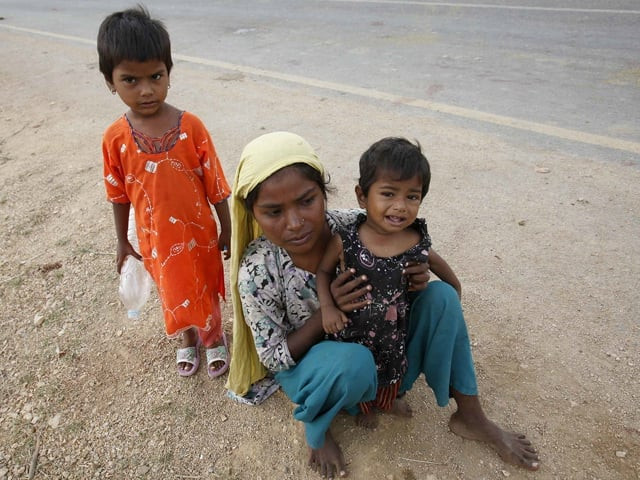Registration? No thanks!
The registration camp was set up to welcome and facilitate people coming from Thatta, Bin Qasim Town DDO said.

Registration? No thanks!
The registration camp was set up to welcome and facilitate people coming from Thatta, Bin Qasim Town DDO Revenue Aslam Khoso told The Express Tribune. The head of each family is asked to get the entire family registered, so that they can be looked after by the government.
“One form is given to each family. The head of the family has to fill the form, mentioning the number of family members, their names, identity card numbers and addresses. At the end of the process, a copy of the form is given to the head with a registration number,” he said.
For the first few days, government officials at the registration camp insisted on registering all the IDPs who were making their way to Karachi. However, as the numbers started hitting thousands, officials found it difficult to register each vehicle and its passengers. The process was made even more difficult as a large number of internally displaced persons (IDPs) refused to stop at the camp and sped off towards the metropolis without the registration.
Official sources at the camp said that they are now registering only those people who are being brought to Karachi in government vehicles.
“Around 300 people have been registered since last night,” said Sarfraz Memon, a primary school teacher who has been working at the Ghaghar Phattak camp along with two other colleagues.
Khalil Ahmed Kalwar, a revenue official who is incharge of the camp, told The Express Tribune that while they were initially asked to stop every vehicle coming from Thatta for registration, they were unable to force people to get the process done as many IDPs were unwilling to talk to the officials.
“While the actual number of flood survivors runs into the tens of thousands, we have been able to register only 9,500 people over the last three to four days,” said Kalwar. “We are tired. How can we determine if a person is a flood survivor if he or she is travelling in a private bus, van or car?” he asked.
However, some flood survivors who were “rescued” by the government and brought to Karachi, claimed that they have been abandoned ever since.
Sabir, also known as Sabo Naahiyo, hails from Darvesh village in Ghora Bari. He said that his family had initially moved to Makli, from where a police van brought them to Karachi. He added, however, that once they were taken to the camp, they were left to find their own way.
“When we reached the link road near Gulshan-e-Hadeed, leading to the Super Highway, the police personnel asked us to get down,” said Sabir, adding, “It was midnight when we stepped out. When we did, the van sped off, leaving us behind.”
According to Sabir, the 20 people who came to Karachi with him were eventually forced to set up a makeshift camp off the National Highway, where no official has come to help them. He claimed that the same is the case for many people who have set up makeshift camps between Thatta and Gujjo.
“I request you to go and see the plight of people living on both sides of the road between Thatta and Hyderabad. There is no place to sit,” he said.
Meanwhile, 50-year-old Saen Bukhsah Shoro, who hails from Ghora Bari, Thatta, stood at the camp, insisting that a revenue officer at the camp register him first.
“Eight to 10 families from our village came here when water entered our village. We are living on a plot of land near Gulshan-e-Hadeed.
None of us had any idea regarding the registration process up until Sunday.
Someone told us that the government has announced compensation money of Rs20, 000 for each flood survivor, which is why we have come to get ourselves registered,” he said.
Shoro added that his family has four cows, for which they had been taxed by the government. “Officials charged us Rs200 as tax for each cow. We told them that we are flood survivors, but no one paid any attention,” he said.
“I have lost everything. I could not take anything with me when I came to Karachi and have lost all my belongings,” said Gul Mohammed Baabro, a flood victim from Sujawal, who was also trying to grab a revenue officer’s attention.
Most of the flood survivors belonging to Thatta have been taken to the Trading Corporation Pakistan warehouses in Pipri, a public school in Gadap and a government school in Ibrahim Hyderi.
Published in The Express Tribune, August 31st, 2010.



















COMMENTS
Comments are moderated and generally will be posted if they are on-topic and not abusive.
For more information, please see our Comments FAQ